
Unclaimed Money Lookup - Michigan
Free Michigan Unclaimed Money Lookup
We receive referral fees from partners (advertising disclosure)
The information we provide you is free of charge and a result of extensive research by our home warranty experts. We use affiliate links on our site that provide us with referral commissions. While this fact may not influence the information we provide, it may affect the positioning of this information.
(advertising disclosure)
The information we provide you is free of charge and a result of extensive research by our home warranty experts. We use affiliate links on our site that provide us with referral commissions. While this fact may not influence the information we provide, it may affect the positioning of this information.

Michigan Unclaimed Money -
The Ultimate Guide 2026
- UPDATED February 2026
Get help finding unclaimed money in Michigan with our guide to unclaimed property in the Wolverine State that walks you through the process.
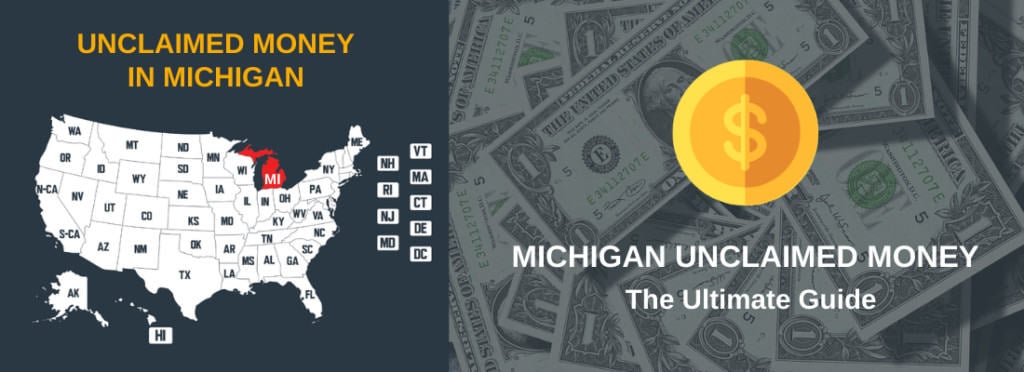
Contents
- Your Guide to Unclaimed Property in Michigan
- What is Unclaimed Property?
- Finding Unclaimed Property in Michigan
- How to File a Michigan Claim
- Michigan Status Checker
- Who Can File Property Claims in Michigan?
- Where Else Can I Look for Unclaimed Property?
- Unclaimed Property Laws in Michigan
- Time Limits for Unclaimed Property

Your Guide to Unclaimed Property in Michigan
Often called The Wolverine State after the university mascot, Michigan is a state that offers loads of help to unclaimed property owners. While you might think that you don’t need to look for missing money because you’re careful, you never know what you might find in the system. The Michigan Department of Treasury created the unclaimed property search to help those who still live in the state and anyone else who lived there get the money that they deserve.

The money that you might find can range from a few dollars that you got back in the form of a refund from a store to $1,000 or more that you earned at a former job. It takes only minutes to quickly search for your money. You can file your claim nearly as quickly, too. With our ultimate guide to unclaimed property in Michigan, you can get all the help that you need to find money in the system and claim it through the Michigan Department of Treasury.
What is Unclaimed Property?
Michigan lists a dormancy period for all the different types of property and accounts that holders have. The holder can range from an insurer who has a policy that a loved one bought to a bank where you opened an account. Michigan requires that holders make multiple attempts to return the property to the rightful owner or the individual’s heirs. If those attempts fail, the Department of Treasury will then take over the property and list it in the online database.
Life insurance payouts are just one example. When you purchase life insurance, your policy requires that you name the beneficiary. This is the person who will inherit the money held by the policy when you pass away. An insurer may contact the state because you overpaid on your policy and earned a refund.
Insurers also send policies to the Department of Treasury when the person who bought the policy passes away, and they cannot find the beneficiary. You may not even know that someone named you the primary beneficiary until you see your name listed on the policy in the database.
Checks that the payee did not cash are also available through the state. Have you ever bought an item from the store and filled out a refund form but never got a check? If the check got lost in the mail or didn’t reach you for any reason, you may find that you can still claim the money that the check held. Uncashed checks often include wages that locals earned on previous jobs that they never got, too. You may find a check for expenses that you had on the job or one that pays you for vacation time that you never used before changing jobs.
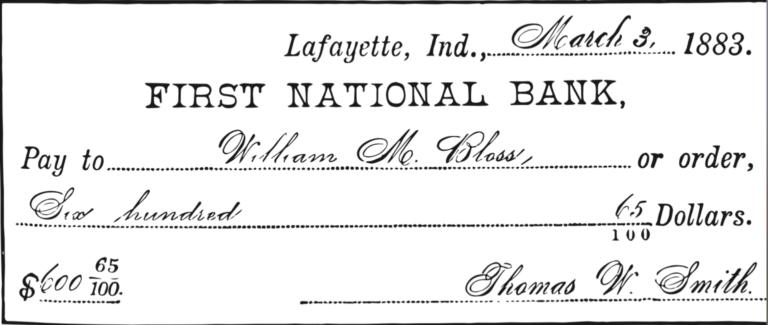
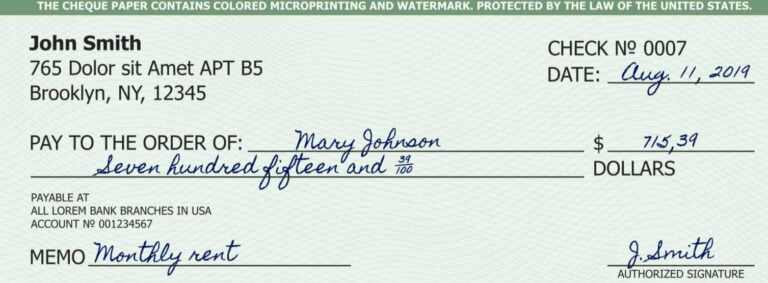
The Michigan database also lists quite a few financial accounts that people opened and abandoned. You might switch to a different bank because the first bank claimed that you owed it money. It may later realize that it made a mistake and credit your account. You may have hundreds of dollars or more in a bank account that the Department of Treasury now lists in the database. The system often has accounts jointly owned by two or more people as well, including those that you opened with business partners, a former spouse or your parents.

Finding Unclaimed Property in Michigan
The Michigan Department of Treasury offers an online unclaimed property search that anyone can use. You also have the option of calling the department for help using the system or if you have any questions. We’ll go over the best way to find unclaimed property in Michigan.
Step 1: Visit the unclaimed property page on the Michigan Department of Treasury website.

Step 2: Look for the box labeled “Claiming Property” on the bottom of the page. Though you can add a zip code or city where you once lived, the system only requires your last name to perform a search.
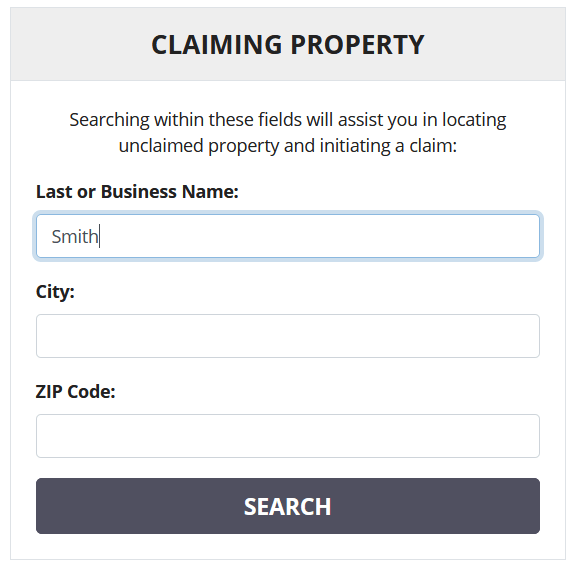
Step 3: View all the results, which may cover more than one page. You need to make sure that your name appears as the owner’s name and that you lived at the address found on the property. Michigan will also list whether the property is worth less than $100, between $100 and $250 or more than $250 along with the name of the agency or organization that filed it.
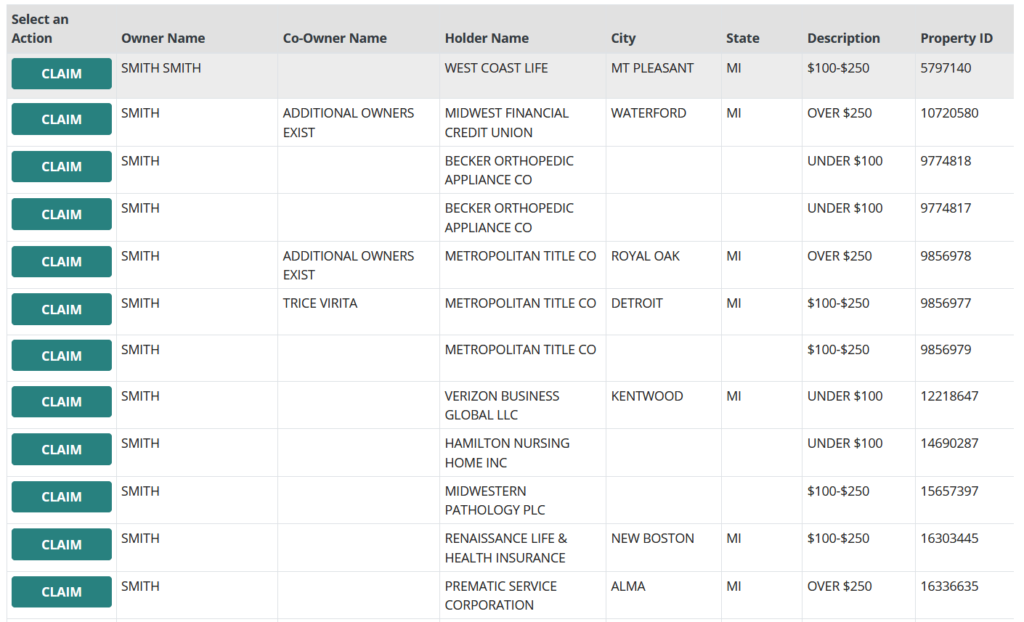
Step 4: Choose the property that you want to claim via the “Claim” button that you see next to the property. If you need, you can claim multiple accounts. You then need to select the “View Claim” button to file.

How to File a Michigan Claim
Before you can file a Michigan claim, you need to do several things. Start with a look at the property claim to verify that it matches all of your information. You will then need to click on the drop-down menu and pick “owner” to file. Michigan allows you to pick from other descriptions that match your situation. Once you click the “File Claim” button at the top of the page, you can work on your claim.

The next page features a form in which you need to share your contact information in case the Department of Treasury needs to contact you. Michigan asks for your date of birth and first and last names. You need to enter an email address that you can access and your home address. Michigan requires either a tax ID number or social security number along with a phone number. Once you complete the form, click the “Next” button to view your claim. This page asks that you type your name and date the form.

You will also need to submit documents through the upload document page. All documents must be of a certain size and contain the required information in a legible way. You also need your claim ID, which appears in the email that you get from the Department of Treasury. If you lose this number or cannot find the email, the department lets you call and request it. Once you upload all the necessary documents, you need to click a box to show that you agree to follow the site’s terms and that the information is correct. You can then click on the “File” button and send your claim to the Department of Treasury.

Michigan Status Checker
Michigan knows that you want your money as quickly as possible, which is why it offers an online status checker. As long as you have the claim ID from your paperwork, you can use this site. Once you enter the ID in the box and click the “Search” button, the site will find your claim in the system. This helps you see if the state received everything that it needs from you or if it’s still waiting on information. The system will update when the Department of Treasury issues the funds, too.
Who Can File Property Claims in Michigan?
When filing a Michigan claim, you can only select the owner option if you are the legal owner and the primary owner listed on the property. The locator option only applies to those who have contracts with the owners. An authorized third party is someone who has legal permission to file for another person such as a guardian or conservator. You can file if you have paperwork that confirms you are the owner of an active business or the primary owner of a closed business.
Michigan also has two options available for those filing as the heir or decedent. You need to select the no probate option if you are the heir of someone who left behind an estate that will not go through probate. This may include someone who died with only a few assets or an estate with a value below the state’s minimum. You can also use this option if you co-owned all of the deceased’s property and it passes to you. The probate option allows heirs and others to file when the estate is still going through the court system. You can file if the court names you the executor or administrator as well as once the court closes the probate case.
Where Else Can I Look for Unclaimed Property?
The Michigan database is a great place to start your search for unclaimed money. It contains accounts that date back decades and allows you to file for anything that you want. Michigan is also one of the states that lists property on the Missing Money website. Ohio, Kentucky and other states also work with this site. You need to search one state at a time to make sure that you don’t miss any of your funds.
Anyone who lives and works in the United States must file their taxes with the Internal Revenue Service (IRS), which has online resources for those who need help. When you pay more in taxes than you owe, you get money back the next year in the form of a refund check. The IRS can help you track down missing refund checks and set up direct deposit to ensure that it never happens again. You might know the Department of Veterans Affairs as a government agency that helps veterans, but it can also help their loved ones. Anyone who serves can get life insurance through the VA and designate who will get the money when they die. The VA helps you look for policies that named you a beneficiary.
If you have problems making your mortgage payments, the Department of Housing and Urban Development (HUD) offers assistance to help you avoid losing your home. It also works with mortgage companies to help shoppers secure home loans. You may find that you got money back from HUD that you can claim online. There is also the U.S. Federal Investments, which helps online users search for treasury bonds. One of the nice things about this resource is that you can get help if you lost your bond after the Treasury Department issued it.
We also recommend turning to the Federal Deposit Insurance Corporation or FDIC for help. Did you ever have a bank account with a branch that shut down or one that merged with another institution? The FDIC knows what happened to the money left in your account and can help you get it back. Though the National Credit Union Administration offers similar help, it only has records pertaining to credit unions.
Many employers help workers set up pensions. They make payments into their accounts that give them money when they retire. Did you know that most of these accounts let the owner designate someone to claim the account when they die and there is still money available? The Pension Benefit Guaranty Corporation has records from some top companies and offers a guide to help you claim an old pension. You may want to check with the U.S. Railroad Retirement Board for retirement funds that belonged to railroad workers, too.

Unclaimed Property Laws in Michigan
A good place to find the unclaimed property laws in Michigan is through the Uniform Unclaimed Property Act. Issued in 1995, this act contains new rules and changes added over the years. You can find out what happens to prepaid funeral arrangements and life insurance policies that go unclaimed as well as checks and bank accounts. The act also covers what holders can do with property that belongs to people in the military. Michigan has several rules put in place to protect those serving the country.
Time Limits for Unclaimed Property
When you stay on top of your property, you don’t need to worry about tracking it down later. Michigan requires that all holders file annual reports that detail any abandoned property that they hold. At least 60 days before they file with the state, they must send a letter to the owner and use the address listed on the property. Michigan charges steep fines for holders who turn over property without reaching out to the owner and those who do not file when they should.
Though banks can state that accounts are inactive after only one year, they cannot claim that the account is abandoned until the owner makes no attempt to use it after five years. Trust accounts only become abandoned after 15 years as many trusts benefit minors who may not know that the accounts exist. Insurers must allow policies to mature for two years after their last contact with the owners and can mark the policy as abandoned after five years. Michigan considers stocks and bonds as abandoned after seven years, too.

Michigan Unclaimed Money FAQs
How Much Unclaimed Property Does Michigan Hold?
The Michigan Department of Treasury holds more than $300 million in unclaimed funds on the behalf of the account owners. In the last five years, Michigan returned more than $400 million to people who used the system to file claims. One user filed a claim for more than $2 million and received a check from the state.
Can I Find Unclaimed Physical Property in the Michigan System?
Though you can find certain physical or tangible property in the Michigan database, you will usually only find things such as safe deposit boxes and stocks and bonds. Holders are also responsible for property that an inmate left behind after leaving a facility and items abandoned in a hospital. The state allows holders to open abandoned safe deposit boxes to make a record of the contents. They must list any valuable items that they find, including stocks, cash, jewelry and firearms. The state will accept most forms of physical property found in those boxes such as deeds and marriage or birth certificates. In many cases, it will hold the physical property until the department locates the owner or next of kin.
Does Michigan Hold Gift Cards?
Michigan only holds gift cards and puts them in the system in certain situations. The cards must come from a business based in the Wolverine State and have the name of the person attached to the card. If the card is a general one that does not have a name on it, you will not find it in the system.
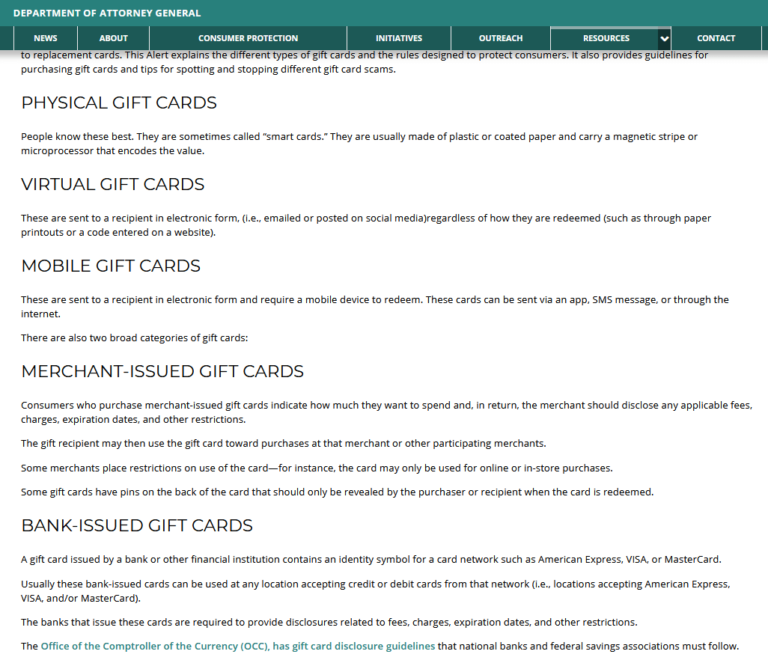
What is the Michigan Safe Deposit Box Auction?
The Michigan safe deposit box auction is an event held every year to sell the contents of abandoned boxes. You can often view the auction catalog online, which allows you to see the items going up for sale. At the end of the auction, the Department of Treasury will set aside the money raised for the boxes’ owners or their heirs and hold it indefinitely. Michigan uses its tax records and other databases to find the owners and return their items to them before the auction. If you see contents that belong to you or a loved one, you can contact the department before the auction and request their return. You usually need to pay any past due rental fees on the box or other costs that the holder incurred before you will get the contents. Though Michigan usually holds the auction in June, it canceled the auction for several years in response to COVID.
Does Michigan Keep Unclaimed Stocks and Bonds?
To buy stocks and bonds, you need to work with a banker who purchases them on your behalf. Brokers are responsible for following all the unclaimed property laws in Michigan, including waiting for the dormancy period to lapse and attempting to contact you. Once the broker verifies that they cannot contact you, they will file a report with the Department of Treasury, which then takes over the securities. Michigan will sell the securities at the current market rate and place the funds in an account for you. You can file for the money raised from the sale of your securities and those owned by close relatives if you are an heir.
Should I Use a Fee Finder?
Fee finders can locate claims and file on your behalf without living in Michigan. The fees that they charge can be very high, especially if you consider that you can do the same things that they do on your own. Though Michigan law allows finders to file property claims, the finders can only do so if they have a signed contract or agreement with the original owner. If someone contacts you and claims that they found money and already filed for you, you do not need to send them any money. You can still go online and use the Michigan system to claim your money.

How Can I Stop Abandoned Property from Happening?
If you want to avoid tracking down your missing property in the Michigan database, you need to keep it from becoming abandoned. Annual audits are a great way to keep on top of your accounts. This lets you see what you own and make sure that it is in good standing with the holder. If you change your home or email address, notify each holder and check your accounts to make sure that they reflect those changes. You need to do the same thing when you change your name or phone number, too.
Conclusion
Do you need some extra money for an upcoming vacation or to pay off an old bill? Thanks to the Michigan system, you can easily find that extra money and maybe even get more than you expected. Use our guide to see all the steps that Michigan requires and what information you need when filing. You can also find out what other resources help you track down your money and what states have unclaimed property databases that you can access online.
Quickly Search For Unclaimed Money
Disclaimer: OurPublicRecords mission is to give people easy and affordable access to public record information, but OurPublicRecords does not provide private investigator services or consumer reports, and is not a consumer reporting agency per the Fair Credit Reporting Act. You may not use our site or service or the information provided to make decisions about employment, admission, consumer credit, insurance, tenant screening, or any other purpose that would require FCRA compliance.